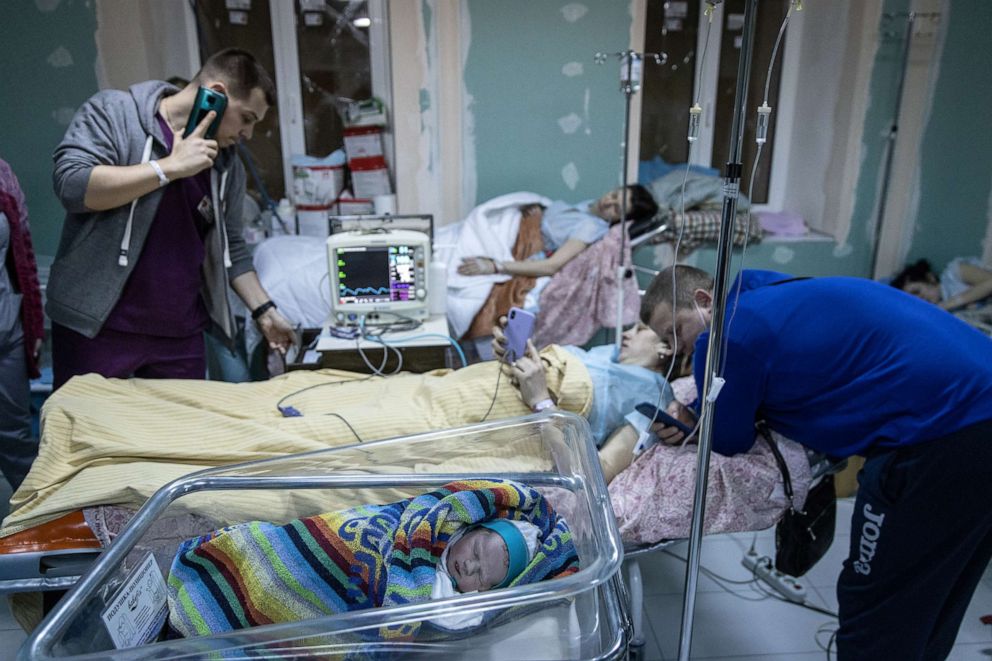乌克兰的妇女和女孩和世界各地的人们遭受了不成比例的痛苦俄罗斯入侵联合国的一份新报告发现。
这政策文件,发布为联合国安理会举行会议讨论乌克兰战争,揭示了战争及其对粮食、能源和金融的全球影响如何导致乌克兰和全球妇女遭受无数苦难。
该报告指出,2月份战争爆发时,265 000名怀孕的乌克兰妇女要么不得不逃离,要么在冲突期间分娩。
它还凸显了欧洲危机如何加剧了世界各地现有的不平等,尤其是在食物匮乏。

In this March 2, 2022, file photo, a newborn baby is seen in the bomb shelter of a maternity hospital in Kyiv, Ukraine.
克里斯·麦克格拉斯/盖蒂图片,文件
报告显示,战争引发的食品价格上涨和短缺扩大了全球食品不安全的性别差距。许多妇女甚至减少了自己的食物摄入量,以供养其他家庭成员。
该报告指出,不断攀升的能源价格导致家庭重新使用不太清洁的燃料和技术,使妇女和女孩面临家庭空气污染,这种污染每年已经导致320万人死亡,其中大多数是妇女和儿童。
根据该报告,乌克兰女户主家庭在战前就已经更加缺乏粮食安全,37.5%的家庭面临中度或严重的粮食不安全,而男户主家庭的这一比例为20.5%。
在俄罗斯军队占领的农村地区,妇女的命运依然悲惨。根据该报告,由于高度不安全和缺乏资源,妇女越来越无法从事农业工作,但她们继续应对为境内流离失所者提供住宿和食物的挑战,这增加了她们的无偿护理和家务工作责任。
此外,官员们表示,学龄女孩甚至更有可能被迫辍学,为绝望家庭的嫁妆或彩礼收入而结婚。报告显示,由于世界各地在冲突、危机和人道主义背景下生活条件恶化,基于性别的暴力、以性换取食物和生存的交易、性剥削和贩运以及早婚和强迫婚姻的增加令人震惊。
“系统性、性别化的危机需要系统性、性别化的解决方案,”联合国妇女署执行主任西玛·萨米·巴胡斯在一份声明中说。“这意味着确保妇女和女孩,包括边缘化群体的妇女和女孩,成为所有决策过程的一部分。这是确保在我们对摆在我们面前的明确事实作出反应时,他们的权利和需求得到充分考虑的唯一途径。”
政策简报呼吁国际社会采取解决方案,优先重视妇女和女孩在冲突应对、恢复和建设和平中的发言权、参与和领导作用,并加强性别统计和按性别分列的数据,为促进性别平等的政策建立证据基础。
联合国还建议国际社会针对妇女和女童的具体营养需求,促进和保护食物权,并加快向更加公平、促进性别平等和可持续的粮食系统转变,以及妇女平等获得投入、技术和市场。
Women and girls affected disproportionately by Russia-Ukraine war: UN report
Women and girls in Ukraineand around the world have suffered disproportionately as the men of the country fight against theinvasion by Russia, a new report by the United Nations has found.
Thepolicy paper, published as theU.N. Security Council meetsto discuss the war in Ukraine, reveals how the war and its global impacts on food, energy and finance have caused women in Ukraine and globally to suffer numerous hardships.
The report states that 265,000 Ukrainian women who were pregnant when the war broke out in February either had to flee or give birth in a time of conflict.
It also highlights how the crisis in Europe is exacerbating existing inequalities around the world, especially surrounding thescarcity of food.
The war-induced food price hikes and shortages have widened the global gender gap in food insecurity, the report shows. Many women have even reduced their own food intake to provide for other household members.
The report states that spiraling energy prices have caused families to return to using less clean fuels and technologies, exposing women and girls to household air pollution, which already kills 3.2 million people per year -- the majority of whom are women and children.
Women-headed households in Ukraine were already more food insecure prior to the war, with 37.5% experiencing moderate or severe levels of food insecurity, compared to 20.5% of male-headed households, according to the report.
The fate of women in rural territories occupied by the Russian military remains dire. The women are increasingly unable to perform agricultural work due to high insecurity and lack of resources, but they continue to rise to the challenge of accommodating and feeding internally displaced people, which then multiples their unpaid care and domestic work responsibilities, according to the report.
In addition, school-aged girls are even more at risk of being obliged to drop out of school to get married for dowry or bride-price income for desperate families, officials stated. The report shows that there are alarming increases in gender-based violence, transactional sex for food and survival, sexual exploitation and trafficking, and early child marriage and forced marriage as a result of these worsened living conditions in conflict, crisis and humanitarian contexts worldwide.
"Systemic, gendered crises require systemic, gendered solutions," Sima Sami Bahous, the executive director of U.N.-Women, said in a statement. "That means ensuring that women and girls, including from marginalized groups, are part of all the decision-making processes. That is simply the only way to be certain that their rights and needs are fully taken into account as we respond to the clear facts before us."
The policy brief calls for solutions from the international community to prioritize women's and girls' voice agency, participation and leadership in conflict response, recovery and peacebuilding as well as to enhance gender statistics and sex-disaggregated data to build the evidence base for gender-responsive policy.
The U.N. also recommended that international communities promote and protect the right to food by targeting the specific nutrition needs of women and girls and accelerate the transformation towards more equitable, gender-responsive and sustainable food systems, equitable access to access to inputs, technologies and markets by women.






